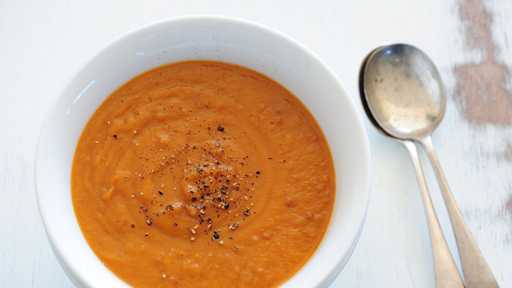In this edition
- Living Healthy with Diabetes Mellitus
- Flavorful Green Beans
- Supreme Mashed Potatoes
- Sweet Potato and Apple Soup
- Simply Delicious: Easy, Healthy Meals with Chef Suzy!
- Thanksgiving Leftovers: Help Control Your Food Budget and Produce Less Waste!
About the Newsletter
Monthly newsletter discussing the prevalence of Type 2 diabetes, and the importance of diabetes management. This issue also provides several delicious fall recipes to try this holiday season, and advice on what to do with our leftovers!
Living Healthy with Diabetes Mellitus
Mordechai Lavi, MD

An older adult couple cooking a healthy meal.
According to the Nevada Diabetes Association, one in three individuals are not aware they are living with diabetes. Thankfully though, diagnosing someone with diabetes is as simple as taking a quick blood test, often with just a prick of blood from your finger in your health provider's office.
The term diabetes has been around for centuries and means passing through; a large discharge of urine in Greek. Later, mellitus, Latin for honey or sweet, was added to the name when the sweetness of urine and blood in those living with diabetes was noted. Basically, those with diabetes are not able to regulate their levels of sugar or glucose in their blood. When these levels get too high, glucose is released resulting in a large discharge of sugary urine.
Even though the medical profession has been familiar with diabetes for hundreds of years, recently diabetes mellitus rates, particularly Type 2 diabetes, have skyrocketed. In Nevada, according to the Americas Health Rankings, 10.9% of the population (337,900 out of 3.1 million) in 2019 was Iiving with diabetes, with 21.7% of those are adults over age 65. Diabetes has devastating effects on your brain, heart, eyes, kidneys and nerves. Those living with Type 2 diabetes are more likely to die from heart attack, stroke, or cancer compared to those not living with diabetes. In 2019, diabetes was the sixth leading cause of death in Nevada.
The key to treating diabetes mellitus, Type 2 diabetes, is lifestyle changes. The National Institute for Health concludes that a diet of seasonal produce with a daily abundance of vegetables and fruit, moderate amounts of fish, poultry, eggs, and red meat only once a week while increasing monounsaturated fats like olive oil are essential. The above eating recommendations along with 150-minutes of moderate-intensity physical activity each week have been shown to decrease the amount of glucose in the blood over a period of two to three months. Examples of moderate-intensity physical activities include walking briskly, dancing, swimming and bicycling -all which use large muscles, increase heart rate and make you breathe harder. Check with your health care provider before starting any new or more intense physical activity; start slow and do it regularly.
In summation, exercise is king, nutrition is queen, put them together and you've got a kingdom. It also takes a community to be healthy, so getting every member of your "community" on board with the changes in diet and activity level is essential to your success.
Thank you for taking the time to learn something new about diabetes as it could turn out to be a life saver for yourself or someone you love!
DR. MORDECHAI LAVI IS AN ASSISTANT PROFESSOR OF INTERNAL MEDICINE AND DIVISION OF GERIATRICS AT UNIVERSITY OF NEVADA RENO. HE SPECIALIZES IN THE CARE OF ADULTS 65 YEARS AND OLDER, AND PRACTICES GERIATRIC MEDICINE.
Flavorful Green Beans

Flavorful Green Bean recipe example. Photo source: EatFresh.Org
Ingredients:
- 2 pounds fresh or 2, 14.5-ounce cans green beans
- 1/2 cup cold water
- 1/3 cup onions, chopped
- 4 cloves garlic, chopped
- nonstick cooking spray
- 1/2 teaspoon black pepper
- 1/2 teaspoon basil dried
- 1/2 teaspoon oregano dried
Learn more about this green bean recipe’s nutritional facts and tools!
Directions (makes 7 servings of 1 cup per serving):
- Place green beans in a large bowl or strainer and rinse. If using fresh, snap off tips. Place green beans in a large pot with cold water. Cook green beans on stovetop over medium heat for 10 minutes. In a separate medium pan, using the cooking spray, saute chopped onions and garlic, for 5 minutes or until they are tender and very lightly browned. Add onions, garlic, and black pepper to green beans. Spray the cooking spray over mixture and cook on medium heat for another 20 minutes or until green beans are tender, but not soft. Stir occasionally. Sprinkle dried basil and oregano over green beans. Mix and serve. Serves seven.
- Add sliced mushrooms to make this a healthy version of a traditional Thanksgiving favorite!
Supreme Mashed Potatoes

Supreme Mashed Potatoes recipe example. Photo source: EatFresh.Org
Ingredients:
- 6 medium potatoes, peeled, cut into chunks
- 2 carrots peeled, chopped
- 3 cloves garlic, finely chopped
- 1/2 cup chicken broth low sodium
- 1 tablespoon butter
Directions: (makes 10 servings of 3/4 cup per serving):
- Combine potatoes and carrots in a large pot and fill with cold water. Bring to a boil and cook 5 minutes. Add garlic and reduce heat to simmer until potatoes and carrots are tender, about 35 minutes. Drain and keep l cup of the cooking liquid. Mash the potatoes and carrots with a hand masher. Combine chicken broth and butter in a small pan; heat over medium heat until the butter melts. Slowly stir broth mixture into the mashed potatoes and carrots. If necessary, add the reserved cooking liquid until the potatoes reach the desired thickness. Serve while hot.
- Don't like orange mashed potatoes? Try parsnips. They are white like potatoes and sweet like carrots.
Learn more about this potatoes recipe’s nutritional facts and tools!
Sweet Potato and Apple Soup

Sweet Potato and Apple Soup recipe example. Photo source: EatFresh.Org
Ingredients:
- 1 tablespoon butter or 1 tablespoon coconut
oil or 1 tablespoon olive oil
- 1 onion small, chopped
- 1 clove garlic, minced
- 1 Granny Smith apple peeled, cored, and chopped
- 1 sweet potato peeled and cut into ½-inch pieces
- 1/8 teaspoon cayenne pepper to taste (optional)
- 1/4 teaspoon ground ginger
- 1/4 teaspoon black pepper
- 1 1/2 cups vegetable broth
- 1 1/4 cups water
- Salt to taste
Learn more about this soup’s nutritional facts and what tools you may need!
Directions (makes 4 cups of 1 cup per serving):
- Melt butter in a large stockpot over medium heat. Add onion and garlic, cook until golden. Add chopped apple and sweet potato, ginger powder, cayenne pepper (if using), black pepper, stock and water. Bring to boil. Reduce heat to low and simmer until the sweet potatoes are soft, about one-hour. Add salt to taste. Ladle as is, or blend and puree until smooth.
Simply Delicious: Easy, Healthy Meals with Chef Suzy!

This live monthly cooking demonstration, sponsored by AARP, and featuring University of Nevada, Reno Extension’s very own, Chef Suzy, will air LIVE on Zoom the second Wednesday of each month. Our next episode with air November 10 at 11 a.m. Chef Suzy will create a meal that is sure to provide you food for thought!
CLICK HERE TO REGISTER!
Thanksgiving Leftovers: Help Control Your Food Budget and Produce Less Waste!

A family gathered in a kitchen.
To ensure that leftovers are safe to eat, make sure the food is cooked to a safe temperature and refrigerate the leftovers promptly. Not cooking food to a safe temperature and leaving food out at an unsafe temperature are the two main causes of foodborne illness. Safe handling of leftovers is very important to reducing foodborne illness. Follow the USDA Food Safety and Inspection Service's recommendations for handling leftovers safely.
FOOD SAFETY TIPS CAN BE FOUND AT HOME | FOOD SAFETY AND INSPECTION SERVICE (USDA.GOV)

This material was funded, in part, by USDA's Supplemental Nutrition Assistance Program (SNAP).
Nevada SNAP-Ed


